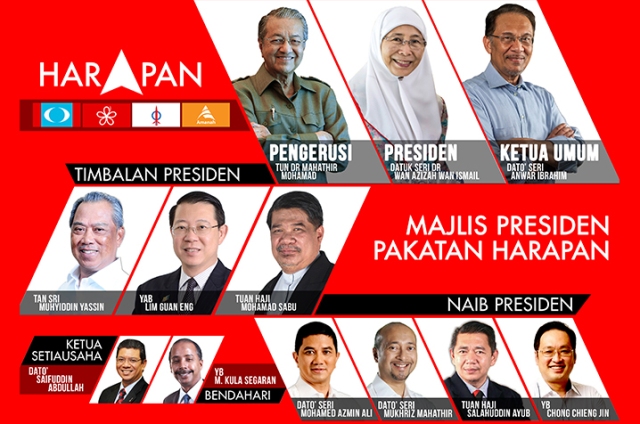
[This is an excerpt from the introduction to the latest special edition of The Round Table: The Commonwealth Journal of International Affairs by guest editors: Chin-Huat Wong and Kee Beng Ooi]
Malaysia’s 14th general election (GE14) on 9 May ended the world’s then longest one-party rule with regular elections, and is undoubtedly a bright spot in the chronicle of 2018, a year during which democracy was pushed by populism and bigotry around the world. After ruling for 61 years, the United Malays National Organisation (UMNO) finally fell at the ballot box.
The victory of the three-year-old Alliance of Hope (Pakatan Harapan, PH), headed by Dr Mahathir Muhamad and Anwar Ibrahim, both former leaders of UMNO and its multi-ethnic National Front (Barisan Nasional, BN) coalition, is the dramatic culmination of 20 years of political fragmentation and realignment. Back in 1998, Dr Mahathir Muhamad, in his seventeenth year as prime minster, sacked Anwar, his heir apparent in both party and government, and subsequently had him imprisoned on trumped up charges of sodomy and power abuse. This led to the outbreak of the Reformasi (Reform) movement and the formation of the Anwar-led People’s Justice Party (Parti Keadilan Rakyat, PKR), which acted as bridge between the Pan-Malaysian Islamic Party (Parti Islam Se-Malaysia, PAS) and Chinese-dominant and secular Democratic Action Party (DAP) to form a united front opposition. This coalition survived until 2015.
Special editions of The Round Table: The Commonwealth Journal of International Affairs
While the opposition could not dislodge Mahathir in 1999, the strongman was forced to retire in 2003 by strong discontent among the ethnic majority Malays. Filling the leadership vacuum left behind by the jailing of Anwar, Mahathir’s soft-spoken successor Abdullah Ahmad Badawi won 64% in votes and a whopping 91% parliamentary majority in the 2004 election. However, Badawi’s failure to deliver reforms despite this extraordinary landslide saw his popularity plummet and the occurrence of three massive rallies mounted against him in late 2007, organised respectively by the Malaysian Bar Council, the Coalition for Clean and Fair Elections and the Hindu Rights Action Force (HINDRAF). The discontent mobilised by opposition parties and civil society groups, coupled with attacks from Mahathir who had fallen out with Badawi a year after the latter’s victory, eventually culminated in the unprecedented and unexpected electoral revolt against BN in 2008, leaving the ruling coalition to hang on to power with a majority vote of 51% and a lead of 30 seats in the 222-member parliament. Mahathir forced Badawi to step down in favour of Najib Razak in 2009, only to turn against the latter by 2014 as the global scandal of state investment arm 1Malayisa Development Berhad (1MDB) surfaced. Failure to remove Razak from within UMNO eventually led Mahathir to form the Malaysian United Indigenous Party (Parti Pribumi Bersatu Malaysia, henceforth Bersatu) in 2016 with his son Mukhriz and Razak’s deputy Muhyiddin Yassin, both of whom were sacked for questioning Razak on the deepening 1MDB scandal.
Mahathir’s emergence as an opposition leader made him a timely saviour for the opposition camp, which was by then in disarray. In 2013, PH’s forerunner, the People’s Alliance (Pakatan Rakyat, PR), won 51% of federal votes but only 40% of parliamentary representation, due to excessive malapportionment and gerrymandering of constituencies a decade ago. By 2015, Razak had successfully dismantled the rising opposition coalition with two moves. First, Anwar, who was freed by Abdullah Badawi in 2004 and positioned as prime minister-in-waiting in 2013, was imprisoned again with a new politically-motivated charge of sodomy. Second, Razak managed to put a wedge between PAS and PR by enticing PAS’s dominant hardliner faction with his express support for the expansion of Syariah criminal law in the state of Kelantan. Formed to succeed PR, PH, which consists of PKR, DAP and a PAS splinter, the National Trust Party (Parti Amanah Nasional, henceforth Amanah), had dim prospects of winning Malay votes. With reconciliation between Mahathir and Anwar through the inclusion of Mahathir’s Bersatu, and with Mahathir’s credentials as a staunch Malay nationalist and effective prime minister, the leadership vacuum in PH was filled. Eventually, an explicit pact within the coalition allowed Mahathir to assume the top post for the two years with the agreement that the baton would be passed on to Anwar thereafter. Anwar would first have to be freed and pardoned after an eventual PH victory, before political reinstatement.
Access the special edition of the Round Table Journal on Malaysia.



